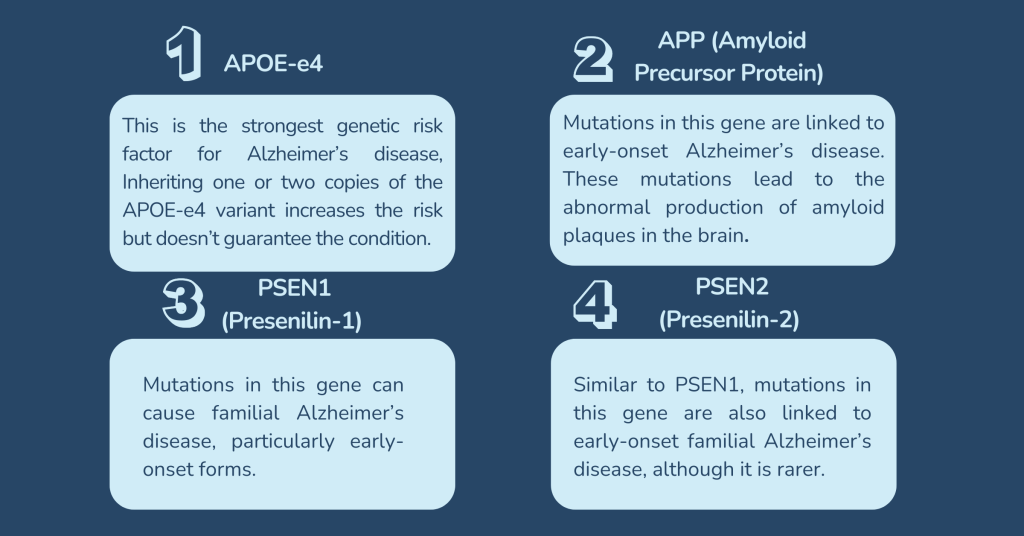If you are at risk, you might also worry about your children facing the same concern. While the possibility exists, it doesn’t mean you will develop dementia in your lifetime. By reading this article, you will gain a clear understanding of how genetics influence the likelihood of developing dementia, the steps you can take to lower this chance, and the tests you can take.
Table of Contents
ToggleIs Dementia Genetic?
Understanding dementia can be a hard nut to crack but before you start worrying about developing it, you must understand every aspect related to it.
Genes are present in every cell of our body, and we inherit them from our biological parents. Sometimes, the genes we inherit have mutations, which can increase the risk of developing certain medical conditions.
When it comes to dementia, it’s uncommon for the condition itself to be directly inherited. This is because different genes play a role in influencing the risk of developing dementia. Four specific genes can increase the odds of developing dementia, and these genes can run in families. However, it’s important to note that having these genes doesn’t guarantee you’ll develop dementia.
- Some people with these genes never develop dementia.
- Others may develop dementia even if they don’t have these genes.

Is Genetic Testing Helpful?
You can take a test to check for the APOE4 gene, which is linked to a higher risk of developing Alzheimer’s. However, the test doesn’t predict whether you’ll develop the disease—it only shows if your risk is higher or lower.
The results tell you how many copies of the APOE4 gene you have:
- One copy: Your risk triples compared to those without it.
- Two copies: Your risk increases 10–15 times.

It’s important to know that not having the APOE4 gene doesn’t mean you won’t develop Alzheimer’s. Around 35% of people with Alzheimer’s don’t carry APOE4.
Steps You Can Take to Minimize the Chances:
Nearly half of dementia cases can be fended off. With the right steps and strategies, it’s possible to slow the progression of symptoms and improve the quality of life.
Simple lifestyle changes, like staying socially active, eating a healthy diet, and getting regular physical activity, can help in keeping dementia symptoms at bay.
Read More: How to Encourage Seniors with Dementia to Eat More
Starting with physical activity helps manage conditions like heart disease, high blood pressure, and obesity, which can all impact brain health. Exercise also lifts mood, reduces stress, and keeps the body flexible and adaptable.
Here are some easy ways to include exercise:
- Walking: A gentle activity that’s great for both physical and mental health.
- Yoga: Helps with balance, relaxation, and overall well-being.
- Aerobics: Boosts heart health and energy levels.
Try to make physical activity a regular part of the day, even if it’s just 20–30 minutes.
Being socially active is just one aspect of a healthy lifestyle. It helps keep your mind engaged and reduces loneliness. However, it’s just one piece of the puzzle. Eating a balanced diet and managing stress or depression is also crucial. Limit alcohol, avoid smoking, and take care of your eyesight and hearing. Together, these habits can help lower the risk of conditions like dementia and Alzheimer’s.
If your loved one has dementia, here are some effective ways to talk to them
How Can You Test for Dementia at Home?
Tests for dementia that can be conducted at home are The Self-Administered Gerocognitive Exam (SAGE)and the clock drawing test.
The Self-Administered Gerocognitive Exam (SAGE) This test analyses cognitive function. It can help identify early signs of dementia and mild cognitive impairment. The test asks questions about memory, language, reasoning, and visuospatial skills. You can perform the test at home as it is available in nine multilingual languages. Next, you can ask your doctor to score it for you.
DementiaTest.online (MCIDET) It features the Mild Cognitive Impairment and Dementia Enquiry Test (MCIDET), a 30-question online assessment that evaluates general cognitive abilities and mild cognitive impairment. The test takes about 5–10 minutes to complete and provides instant scoring.
My Mind Test It offers an interactive online assessment that screens for dementia by evaluating memory, problem-solving, and social functioning. It’s a practical way to monitor your brain health and identify potential concerns early on.
BrainTrack It’s a free app developed by Dementia Australia that helps people in monitoring their brain health and keep track of cognitive changes with time.
NIH Toolbox V3 iPad app This app checks cognitive and overall health by offering 50 tests. It measures memory, emotional health, motor skills, and sensory function.
These tests are typically designed for individuals who are beginning to show signs of mild cognitive impairment. They can help identify potential issues, allowing you to consult your doctor at the right time.
How We Can Help?
Dementia can bring challenges, but you and your loved one don’t have to face them alone. With the right support, life can still be meaningful and fulfilling. We’re here to provide the care and understanding you need during this journey. Our caregivers are compassionate and experienced in dementia care, offering personalized support, companionship, and help with daily activities to make life easier and more comfortable.
Let’s work together to provide the care and reassurance your family deserves. Reach out to us today!
Wrapping Up:
The fear of developing dementia if a close family member has it is completely valid, but it’s important to remember that a diagnosis in your family doesn’t mean it’s your destiny. While genetics, like the APOE4 gene, can increase your risk, many people with these genes never develop dementia. Lifestyle choices play a huge role in protecting brain health. If you’re worried, at-home tests can offer some insights, but it’s always best to consult a doctor for proper guidance.
FAQ’s
Q. What foods should you avoid if you have APOE4?
If you have the APOE4 gene variant, avoid foods high in saturated fats (like red meat, butter, and full-fat dairy) and trans fats (found in fried and processed foods), as they can increase inflammation and Alzheimer’s risk. Limit sugar, sugary drinks, and refined carbohydrates like white bread and pastries, which can lead to insulin resistance. Alcohol should also be minimized or avoided, as it may heighten your risk. Additionally, some experts recommend being cautious with gluten and lectins, as they may contribute to inflammation in sensitive individuals. Focus on a Mediterranean-style diet for better brain and heart health.
Q. What is the main risk factor for dementia?
The most significant risk factor for dementia is age. The likelihood of developing dementia increases significantly as you get older, particularly after age 65
Q. How to detect dementia?
Dementia can be detected through a combination of:
- Observation of symptoms: Memory loss, confusion, difficulty with language, and changes in behavior.
- Cognitive tests: Standardized tests like the Mini-Mental State Examination (MMSE) or Montreal Cognitive Assessment (MoCA).
- Medical evaluations: Blood tests, brain imaging (MRI or CT scans), and neurological exams to rule out other causes.
- Professional assessment: Diagnosis from a doctor or specialist, such as a neurologist or geriatrician, is essential for accurate detection.
Q. What are the three golden rules of dementia?
- Don’t ask too many questions: Avoid overwhelming or confusing the person.
- Don’t contradict: Validate their feelings instead of arguing.
- Listen and earn trust: Be patient and attentive to build a sense of safety
It is important to understand the specific needs of each stage of dementia. Using these clues in the wrong context can create more challenges.
Q. What are the odds of getting dementia by age?
The likelihood of developing dementia increases significantly with age, roughly doubling every five years after age 65:
- Age 65–69: Around 2 out of 100 people have dementia.
- Age 85–89: About 19 out of 100 people are affected.
- Age 90 and older: Approximately 33 out of 100 people live with dementia.
While dementia can occur at any age, it is most common in those over 65. This is because the conditions that cause dementia, such as Alzheimer’s disease or vascular disease, typically take many years to develop and damage the brain.

Fakiha is an experienced writer at ConsidraCare with an optimistic interest in life. She has a proactive approach to improving health and wellness for seniors. She offers well-researched and thoughtful information to help individuals make informed healthcare decisions for themselves and their loved ones.



